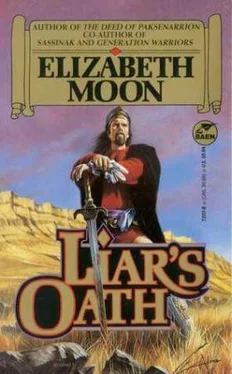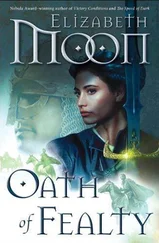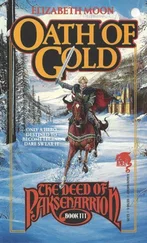“He . . . didn’t hate me?” It took all his courage to ask that; it was the deepest fear in his heart, that he had somehow earned his father’s hate. Against it he had mounted a fierce defense—it wasn’t his fault, it wasn’t fair.
“Esea’s light! No, he didn’t hate you. He put all his hopes on you, but understood only one thing to hope for, and pushed too hard. He was desperate, by then, but that doesn’t excuse him.”
“No.” Luap stared at the pavement under his feet. He had held that grudge too long; he was not ready for a father who had had problems of his own, who had been desperate, who had placed a kingdom’s weight on the hope that his latest bastard would grow to have the tools of magery. He was not ready to consider how a king might be trapped by something more honorable than his own pleasure. “My . . . mother?” For the instant it took Arranha to answer, he held the hope that she had been mageborn too.
Arranha gave a minute shrug and spread his hands. “I’m truly sorry; I know nothing about her. When I saw you, she was nowhere in evidence. A tutor had you in hand, and bragged to the king of your wit.”
“I don’t remember her.” He said that to his locked hands, staring at his thumbs as if they were the answer to something important. “I never knew—except that I couldn’t ask. It made them angry.”
“I daresay it frightened them as much as anything. You know the peasant customs: the mother’s family determines lineage. We overrode that, whenever our law intruded into the vills, but quite often the peasants evaded our law one way and another. If you had found your mother, if she had claimed you, her people might have helped her get you away and hide you.”
“But she didn’t.” Luap strained for any memory of his mother, forcing himself to imagine himself an infant, a child just able to stand. Surely he would remember who had suckled him, that first deep relationship; surely he could raise it from the deep wells of memory. A face hovered before him, dim and wavering like the reflection of his own in a bucket of water.
Arranha shrugged again. “It’s likely she couldn’t. She may have been sent far away; she may have died. That I don’t know. Your problems were not her fault, Luap, any more than they were yours.”
Too much too soon. His mind ached, overstretched with new and uncomfortable revelations. He had had it all organized, he thought, his past tidied into a coherent tale of childhood wrongs and struggles flowing logically into the conflicts of his adult life. He had constructed it of his own pain, his own understanding, and he had become comfortable with it. Now he must revise it, and found he was unwilling to do so. Tentatively, somewhere in his head, a new version began to take shape, safely remote from the other . . . something he could revise, to bring it into conformance. A tragic king, struggling against destiny—an equally tragic peasant victim, a child doomed from the start to be less than anyone’s hopes, including his own.
He spent the rest of that day pretending to write, hoping no one would ask what he was doing. He wanted no supper, but knew that if he did not eat with the others, someone would ask questions. So he forced the food down, complained with the others of the heat, and spent a restless night by his window, staring at a sky whose stars held no messages for him.
The old lady returned days later, as Arranha had predicted. In those two days, Luap had struggled to regain the balance she had disrupted. Arranha had told Gird which king had really fathered him; Gird had grunted, scowling, and then given Luap one of his looks.
“What difference d’you think it makes?” Gird had asked. Luap felt abraded by the look and the question, as if the mere fact of stating his real parentage had been an evasion, or a request for something Gird could not approve. He realized he’d hoped for understanding, for Gird to move toward a more fatherly or brotherly relationship, but now he saw that could not happen. Anything that reminded Gird of his father’s blood and rank—even this, which should have made it better—aroused the old antagonism.
This day she came early, before the late-morning heat. He heard, again, her voice below, and went down to meet her. Be gentle , Arranha had said; he wasn’t sure he could be gentle, but he could be courteous. She wore a dress equally costly, but different, from the day before, more blue and less green in its pattern. Lady Dorhaniya’s servant gave him another warning look, as he led them toward an inner room on the ground floor. He had no idea what it had been, but recently it had housed scribes copying the Code from his originals. These, at his nod, left their work gladly enough. The room had a high ceiling and tall narrow windows opening on a court shaded by trees and edged with narrow beds of pink flowers; it held night’s coolness and the scent of the flowers as well as the tang of ink and parchment.
“No need to climb the stairs,” Luap murmured, offering her a chair. Lady Dorhaniya smiled, but tremulously. Clearly she had something on her mind.
“Thank you, young man. Now let me just catch my breath—”
“A drink of water?” The scribes kept a jug in their room; he poured her a mug. She took it as if it were finest glass, and sipped.
“You should sit down, young man. What I have to say is . . . is very important to you.”
Luap tried to look surprised. “I thought perhaps you’d come about something in the Lord’s Hall.”
“No. It wasn’t that.” She peered at him, then sat back, nodding. “I wasn’t wrong, either. I may not be as young as I was, but I’ve not lost my memory, for faces. Tell me, these men call you Luap, but do you know your real name?”
“I’ve always been told it was Selamis,” Luap said.
“Ah. You have reason to wonder?”
He shrugged. “Lady, by what I was told, my mageborn father chose my daily name, and gave me no other—common enough with such children.”
“You know that much,” she said, her eyes bright. “Do you know which lord fathered you?”
“I’ve been told it was the king,” Luap said with more difficulty than he’d expected. “But many bastards dream of high birth.”
She bent her head to him, in so graceful a movement that he did not at first recognize it as a bow. “Then I will confirm what you were told: you were the king’s son—not this recent king, but Garamis. I saw you many times as a small boy, and you have the same look about the eyes you had then. Your mother was, it’s true, a peasant lass—a maidservant in the summer palace—but some said she had mageborn blood a generation or so back.”
Even knowing it was coming didn’t help. He felt the same helpless rage and fear that had overwhelmed him while listening to Arranha. This old lady, so secure and decent, had seen him, remembered him. She had seen his mother, no doubt; she had known his father. He shivered, and looked up to find them both staring at him. The old lady’s servant—Eris, he remembered—had a look he could interpret as contempt.
“Does it bother you?” Lady Dorhaniya asked. Her eyes were altogether too shrewd. “You were a charming boy, very well-mannered, and you’ve grown to a charming man. . . .” It was almost worse, though he could not explain it. If he’d been a bad child, cruel or wicked or dull, that could justify what had happened to him. If his father had been the last, most wicked king, that could justify what had happened to him. But he could see, against the inside of his eyelids, the child he had been, the child she was now describing so carefully . . . the child who wanted so much to please, the child alert to the wishes of those who cared for him. “—you brought me a little nosegay,” she said. “So thoughtful, for such a young boy. . . .” He had learned that from a mageborn youth, a few years older, and found it impressed ladies visiting; he had made nosegays for all of them. “—and recitations. Your father had you stand up one night before dinner, and speak the entire text of Torre’s Ride . You must have been nine or so, then—”
Читать дальше












